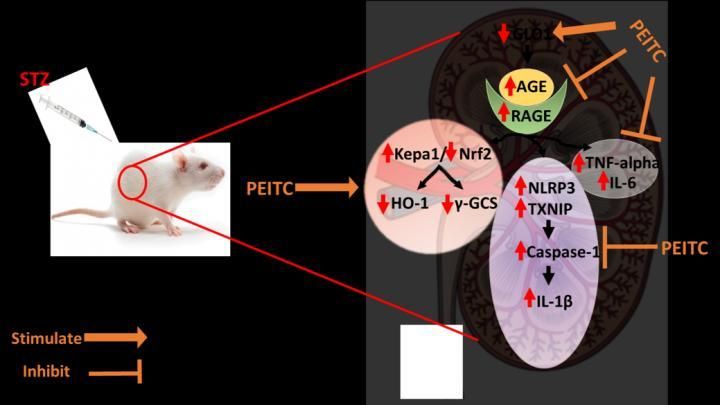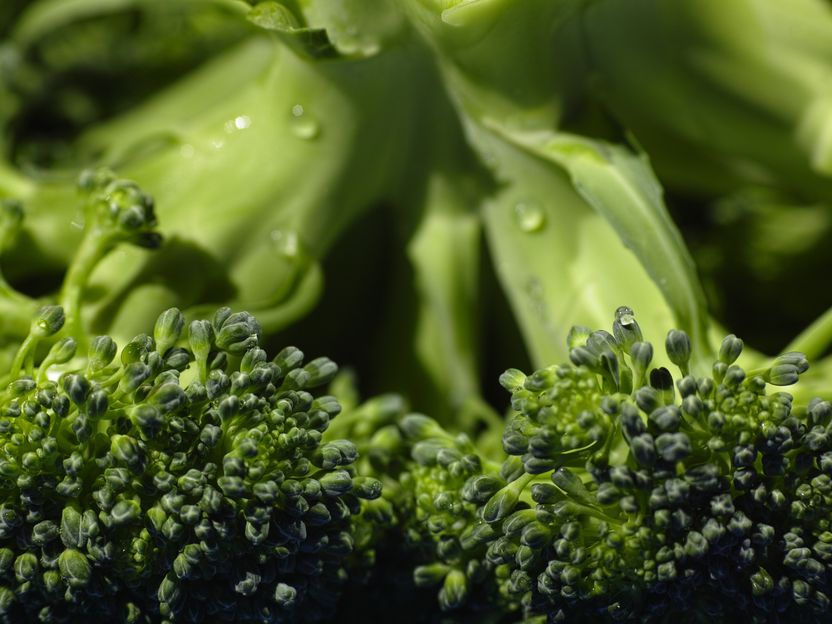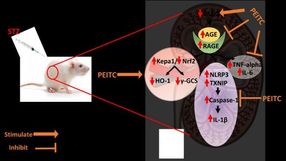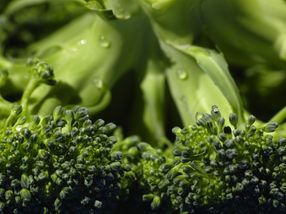Compound found in some vegetables may reduce diabetes-related kidney damage
Phenethyl isothiocyanate, derived from watercress and other cruciferous vegetables, shows benefits in rats
New research conducted in rats suggests a compound that gives some cruciferous vegetables their pungent taste could help to reverse kidney problems associated with diabetes.

schematic illustrating how PEITC treatment affected induced nephropathy in rats by modulating glycative stress, oxidative stress and inflammatory pathways.
Image courtesy of Mohamed El-Sherbiny, AlMaarefa University.

pixabay


It is estimated that about one-quarter of people with diabetes will eventually develop diabetic nephropathy, a gradual loss of kidney function eventually requiring dialysis. The condition is a leading cause of chronic kidney disease in the U.S. and is also associated with a high risk of heart disease. There is currently no cure.
For the new study, researchers assessed the effects of phenethyl isothiocyanate (PEITC) in rats with diabetic nephropathy. PEITC is found in several types of vegetables but is most concentrated in watercress.
"Our study provides, for the first time, evidence that PEITC might be effective as a naturally occurring agent to reverse serious kidney damage in people with diabetes," said lead study author Mohamed El-Sherbiny, PhD, a postdoctoral fellow at AlMaarefa University in Riyadh, Saudi Arabia. "Our study introduces mechanistic evidence of how PEITC might manage kidney injury associated with diabetes by targeting multiple interconnected pathways involved in diabetic nephropathy, including inflammation, glycation and oxidative status."
El-Sherbiny will present the research at the American Association for Anatomy annual meeting during the Experimental Biology (EB) 2021 meeting, held virtually April 27-30.
Previous studies have suggested sulforaphane, a related compound in cruciferous vegetables, also helps reduce diabetes-associated kidney damage. The new study bolsters the evidence that eating more vegetables containing these compounds could help people with diabetes to stave off kidney problems.
"PEITC seems to manage one of the most serious and painful diabetic complications. Luckily, PEITC is naturally present in many dietary sources, importantly watercress, broccoli, turnips and radish," said El-Sherbiny.
Since the research was conducted in animal models, further studies will be needed to confirm the findings and understand how the results could translate to new treatments or dietary recommendations for people with diabetes.
El-Sherbiny will present this research from 3:45-4 p.m. Thursday, April 29 (abstract). Contact the media team for more information or to obtain a free press pass to access the virtual meeting.
Most read news
Topics
Organizations
Other news from the department science

Get the food & beverage industry in your inbox
By submitting this form you agree that LUMITOS AG will send you the newsletter(s) selected above by email. Your data will not be passed on to third parties. Your data will be stored and processed in accordance with our data protection regulations. LUMITOS may contact you by email for the purpose of advertising or market and opinion surveys. You can revoke your consent at any time without giving reasons to LUMITOS AG, Ernst-Augustin-Str. 2, 12489 Berlin, Germany or by e-mail at revoke@lumitos.com with effect for the future. In addition, each email contains a link to unsubscribe from the corresponding newsletter.



























































